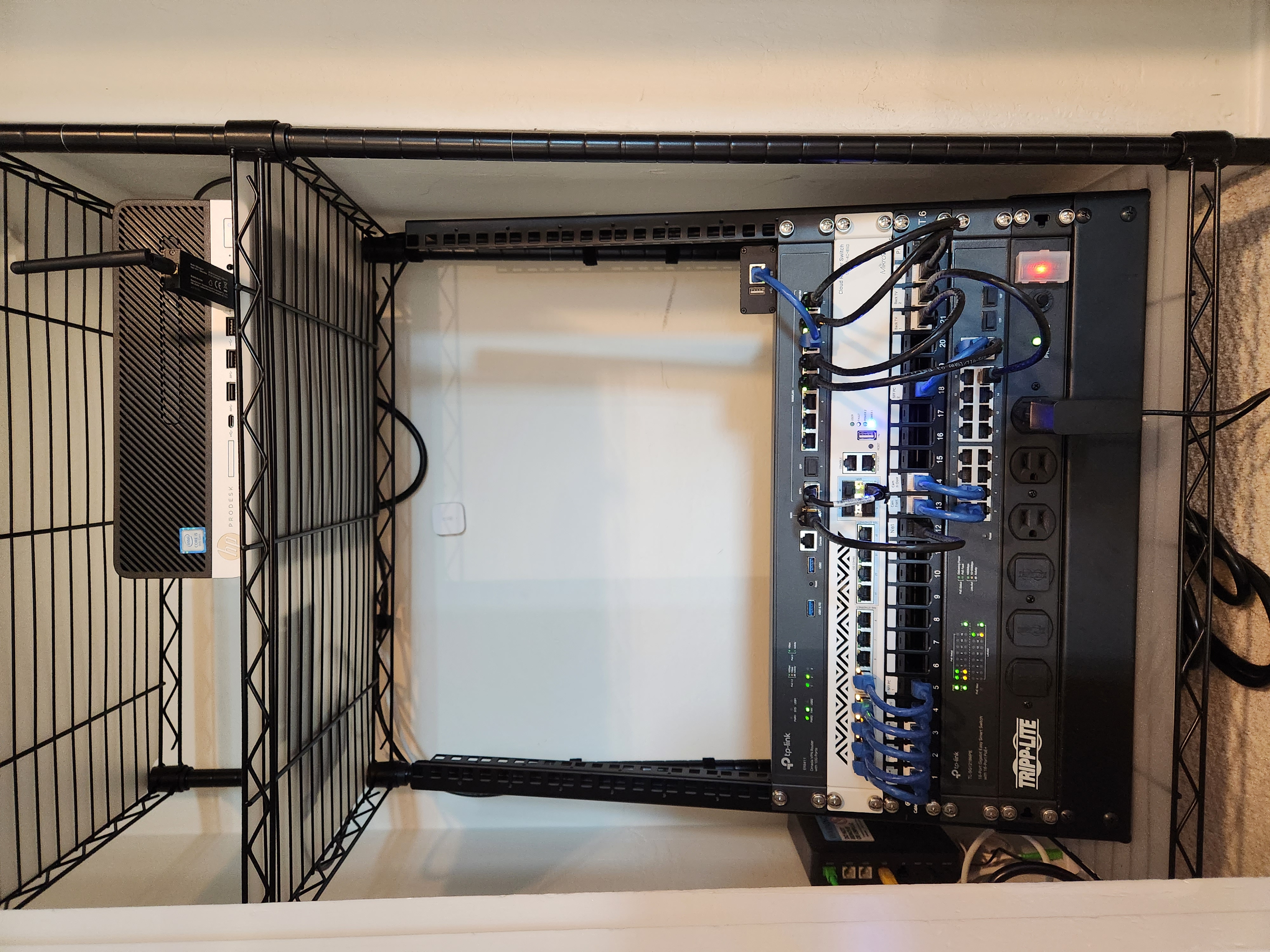I couldn't find a "Home Networking" community, so this seemed like the best place to post :)
My house has this small closet in the hallway and thought it'd make a perfect place to put networking equipment. I got an electrician to install power outlets in it, ran some CAT6 myself (through the wall, down into the crawlspace, to several rooms), and now I finally have a proper networking setup that isn't just cables running across the floor.
The rack is a basic StarTech two-post rack (https://www.amazon.com/gp/product/B001U14MO8/) and the shelving unit is an AmazonBasics one that ended up perfectly fitting the space (https://www.amazon.com/gp/product/B09W2X5Y8F/).
In the rack, from top to bottom (prices in US dollars):
- TP-Link ER8411 10Gbps router. My main complaint about it is that the eight 'RJ45' ports are all Gigabit, and there's only two 10Gbps ports (one SFP+ for WAN, and one SFP+ for LAN). It can definitely reach 10Gbps NAT throughput though. $350
- Wiitek SFP+ to RJ45 module for connecting Sonic's ONT (which only has an RJ45 port), and 10Gtek SFP+ DAC cable to connect router to switch.
- MikroTik CRS312-4C+8XG-RM managed switch (runs RouterOS). 12 x 10Gbps ports. I bought it online from Europe, so it ended up being ~$520 all-in, including shipping.
- Cable Matters 24-port keystone patch panel.
- TP-Link TL-SG1218MPE 16-port Gigabit PoE switch. 250 W PoE power budget. Used for security cameras - three cameras installed so far.
- Tripp Lite 14 outlet PDU.
Other stuff:
- AdTran 622v ONT provided by my internet provider (Sonic), mounted to the wall.
- HP ProDesk 600 G5 SFF PC with Core i5-9500. Using it for a home server running Home Assistant, Blue Iris, Node-RED, Zigbee2MQTT, and a few other things. Bought it off eBay for $200.
- Sonoff Zigbee dongle plugged in to the front USB port
- (next to the PC) Raspberry Pi 4B with SATA SSD plugged in to it. Not doing anything at the moment, as I migrated everything to the PC.
- (not pictured) Wireless access point is just a basic Netgear one I bought from Costco a few years ago. It's sitting on the top shelf. I'm going to replace it with a TP-Link Omada ceiling-mounted one once their wifi 7 access points have been released.
Speed test: https://www.speedtest.net/my-result/d/3740ce8b-bba5-486f-9aad-beb187bd1cdc
Edit: Sorry, I don't know why the image is rotated :/ The file looks fine on my computer.

Neat. Where does your ONT connect to?
On my side, I have a CAT6 patch cable going from the ONT into the patch panel via a keystone jack coupler (basically a small device with an RJ45 port on both ends): https://www.amazon.com/gp/product/B00WKPK7BK/. Apparently, using couplers like that isn't ideal, but I do still get full speed through it. If it becomes an issue, I'll chop the end off the cable and attach a proper RJ45 keystone. I just really hate crimping RJ45 connectors.
As for the fiber to the ONT - The internet company ran fiber from the power pole in the street, to the side of my house near where the power cable comes in, along the side of the house, into the crawlspace under the house, through the floor of the closet, into their ONT.
I would have preferred the fiber come to a wall plate rather than just through a hole in the floor, but ISPs generally don't do wall fishing.
Also, unfortunately their ONT only has an RJ45 port, otherwise I'd use a DAC cable from the ONT directly into the router.